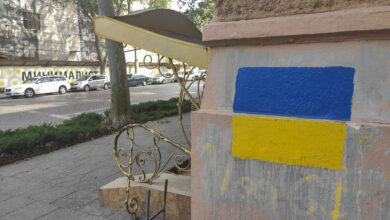Children of Chernobyl escape war in Ukraine

Ivankiv, Ukraine, May 13 (EFE).- Olexander is four years old and is the only child playing on the swings in his village. His parents have told him that they are afraid that the bad guys will return and that is why he – like the more than 100 children from Ivankiv, about 70 kilometers from the border with Belarus – will flee to Ireland with his mother.
He greets the Ukrainian soldiers as if they had always been part of the landscape. His mother prefers not to talk about what the Russian occupation meant for her. She prefers not to remember, thinking only of leaving the village.
“We need to get out of here and we want to stay as long as possible, until everything is over. We are afraid that the situation will repeat itself,” Ana, his mother, who is 30 years old, with straight red hair and a face full of freckles, explains to EFE.
“Before the war we used to go on weekends to the grandparents’ house. I had a job, we’d come to the park, we’d plan a vacation in Kherson, by the sea,” she laments.
Ana has already packed her bags and is waiting to be called to Westport in Ireland by an organization that last week took 100 children and 14 mothers out of the town, a city council representative told Efe.
The collaboration between the organization and the municipal authorities goes back a long way, since 1986, when this town experienced another catastrophe: Chernobyl.
Ivankiv, home to 10,000 inhabitants, lies just 53 kilometers from Chernobyl. In the town square there is still a gauge showing the levels of radiation 25 years after the nuclear accident.
According to Oksana Kadun, deputy mayor and doctor, the exposure to radiation is especially harmful for children and that is why the programs for children from this area who spend their summers in Ireland from time to time are still running. With the war, the aid has intensified.
Andrei’s wife and three children left in the first convoy just a few days ago. Andrei, in his 50s, walks alone through the village. He doesn’t look very happy but he insists that he is: Illya (17), Matvey (14) and Marc (11) are finally safe.
“They are going to be able to rest, recover and experience better emotions. They will have security and opportunities,” he says.
He hopes they will not return until the end of the war. The Ukrainian government does not fear attacks from Belarus but he is still anxious because of how close they are to the border.
“We don’t know what is going to happen, but the military is moving and massing. I feel it is all very dangerous,” says Andrei, who like all Ukrainians between 18 and 65 years old has to stay in his country, ready to enlist.
Deputy Mayor Oksanka Karun is, like everyone else, worried about what might happen on the border with Belarus, but as a municipal official she does not stop to think about what is to come.
She has enough to do with repairing the damage that the Russians left in their wake in the entire Ivankiv region, which includes a dozen villages where a total of 30,000 people live.
Leaving the deaths and psychological damage aside, “2,000 buildings in the region were destroyed, 240 houses are completely gone and 10 percent total housing has been damaged,” Karun says.
Summer is coming but in a few months winter will return. “We have problems. We have to find houses where people who have lost everything can live, make repairs to the public space, and help the neighbors,” she says.
Pouring a coffee, she says: “We Ukrainians have something that the invaders cannot steal from us: our independence and our smile. Our people are going to plant potatoes, and tulips.” EFE
lvp/ks





